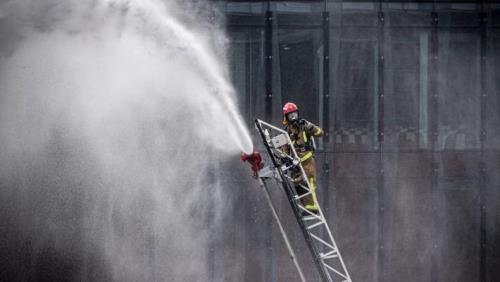Charred ruins of SkyCity centre reminds us firefighting is a dangerous job
20 NOVEMBER 2019

People watched aghast as the new SkyCity Convention Centre burnt for days in Auckland.
It seems that the oversight on the part of a contractor leaving a heating fan going without supervision sparked the fire. No doubt a formal enquiry and possible litigation might determine things with more accuracy.
Former prime minister Sir John Key and the Auckland City Council will have watched a dream go up in smoke, or at least be delayed for several years.
The new convention centre was going to be a centrepiece for Auckland and New Zealand in hosting overseas conferences. Instead, it became the centre of attention for a medium term eyesore.
The firefighters' union complained about the standard of the high altitude equipment used, claiming that some of the high ladders were out of commission and others were of marginal use because they had not been maintained.
Firefighters also complained that many of their members worked for perhaps 24 hours without getting adequate breaks.
With very few exceptions, our Health and Safety legislation requiring a safe place of work applies to everyone, including firefighters. However, people who are engaged as firefighters or police officers know that their work is at times dangerous and that they will be expected to take risks.
Obviously, there is a tension between ensuring safety and engaging in dangerous work. The Health and Safety at Work Act provides guidance on this.
Employers must ensure the health and safety of their workers "so far as reasonably practicable". This means considering what is reasonably able to be done at a particular time.
An employer has to weigh up all relevant matters, including the likelihood of harm, the degree of harm, and what the person knows about the hazard or risk and way of minimising or eliminating it. The Act requires employers to engage with workers.
A good case illustrating these issues is Buchanans Foundry. This case was decided under the old Health and Safety in Employment Act 1992, but is still helpful.
The employer was charged after a furnace exploded, throwing a large quantity of molten metal and solid scrap from the furnace, injuring three workers. All were wearing protective clothing.
The district court found that the Foundry had done a great deal to protect the workers, but not enough. Even though there was no protective equipment that could have prevented harm, there was "Pyrotek" equipment that could have provided a greater measure of protection by reducing the burning.
Even though the Pyrotek equipment would not have completely protected against harm, the district court ruled the Foundry still had to use the best that was available.
The High Court overruled this decision. The first reason was the district court judge did not carry out a balancing exercise in comparing protective equipment.
Expert evidence was given that any choice of protective equipment required comparison and compromise. For example, gear protecting workers from radiant heat and molten metal is maximised by thick fabric and multiple layers, but this creates added physiological stress on the wearer. A balance must be struck.
The High Court also considered the efforts of the employer to enhance the safety of its workers. This included considering the suitability of Pyrotek, which was considered not to meet New Zealand safety standards at the time.
The High Court Judge spoke favourably of the Foundry's actions, saying the requirement to take all reasonable steps is not a counsel of hindsight perfection but requires considerations of "due diligence" and doing what a "reasonable man" would have done under the circumstances. The Foundry did this and the prosecution failed.
Clearly, this employer went to great lengths to do what was correct and in the end it was recognised.
The effect of the convention centre fire has obviously impacted on our fire service personnel who put in an extraordinary effort to quell the fire. The balancing act of having fire service personnel work on extremely rare fires while caring for their health and safety is a difficult issue.
It seems the Health and Safety legislation's emphasis on engagement between businesses and those with a stake in health and safety is the best place to work this out.
Ideally firefighters should not have had to work for more than 24 hours, although the circumstances of the fire seemed to require that. We do not know whether that could have been avoided.
But on any analysis, the charred ruins of the Convention Centre remind us of the courage and commitment of our emergency services. They can also remind us of the need to provide for their safety.


